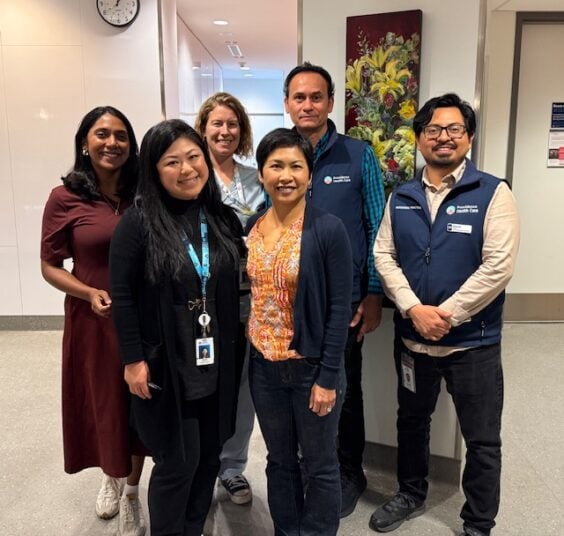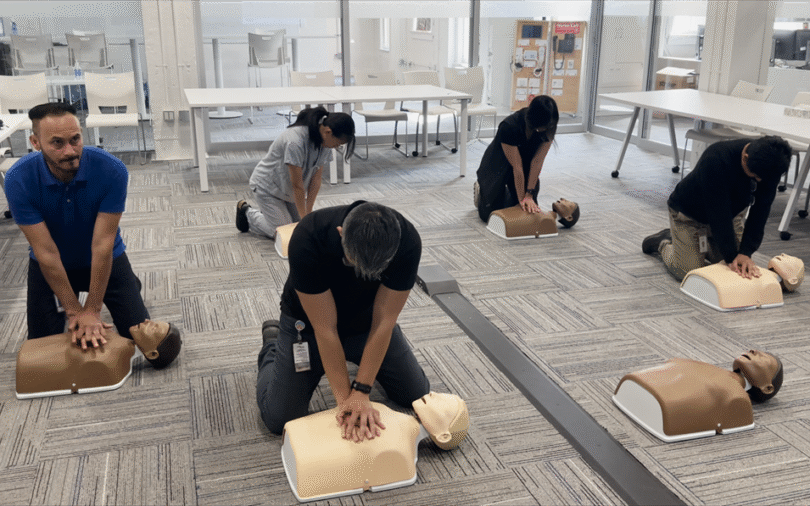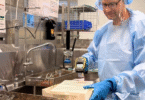At Providence Health Care, learning is a continuous journey. In recognition of Health Care Simulation Week, we’re highlighting one of the most impactful ways we support staff development: simulation-based training.
Over the past three years, simulation activity at Providence has increased by 30 per cent, underscoring its growing importance across clinical teams. In 2024, more than 245 simulations were delivered, and by mid-2025, that number had already been exceeded.
These sessions go beyond practice; they are a critical part of how we prepare health care teams to deliver safe, high-quality care when it matters most.
What is simulation in health care?
Simulation is health care’s rehearsal space. It allows teams to safely practice clinical scenarios before they encounter them in real patient care. At Providence, simulation encompasses both program-specific training and organization-wide or professional practice–led initiatives, such as mock codes and emergency response exercises. It spans a range of modalities—from high-fidelity simulations with advanced manikins to low-fidelity role-playing and tabletop exercises.
Examples include:
- Lifelike manikins that breathe, speak, and respond like real patients
- Virtual reality environments for immersive emergency response training
- Recreated clinical spaces to rehearse complex procedures and team dynamics
- Mock codes and mass-casualty drills to test emergency readiness
“Simulation gives our staff the opportunity to learn by doing,” says Tanya Choy, Education Strategy and Simulation Consultant at Providence. “It builds confidence, strengthens communication, and helps teams prepare for high-stakes situations.”

Why simulation matters
In health care, preparation can make the difference between life and death. Simulation helps Providence’s teams:
- Practice high-risk or uncommon skills in a controlled setting
- Strengthen collaboration and communication
- Reduce anxiety and prevent errors through structured debriefing
- Prepare for emergencies such as Code Blues or mass-casualty events
- Identify workflow gaps and test new protocols
“Every simulation is a chance to improve,” says Tanya. “We’re not just training individuals, we’re building stronger, safer teams.”
Spotlight on new CPR training equipment
To celebrate Simulation Week, Providence introduced new CPR training equipment designed for classroom use. The kit allows up to six participants to train simultaneously, with real-time feedback provided through an app.
Features include:
- Performance metrics on compression rate, depth, release, and ventilation
- Coaching prompts to improve technique
- Realistic airway anatomy for hands-on practice
“This new equipment makes CPR training more engaging and efficient,” says John Bonilla, Simulation Operations and Technology Lead.
“Staff were energized during the demo. You could see how much they valued the opportunity to practice and refine their skills,” adds Melissa Ko, Interim Simulation Educator.
A culture of learning and growth
Simulation is just one part of Providence’s broader commitment to professional development. From onboarding to advanced clinical training, we invest in tools and experiences that help our people thrive.
That commitment is about to grow even stronger with the launch of a new Clinical Skills Space. “This space will feature state-of-the-art technology, especially the Enhanced Rooms, which will allow us to deliver high-fidelity simulations using a variety of advanced simulators,” says John. “It’s an exciting step forward in how we support learning and readiness across the organization.”
If you’re passionate about health care and looking for an organization that prioritizes learning, teamwork, and growth, Providence offers a place where your skills can make a lasting impact. Visit www.careers.providencehealthcare.org for more information.





